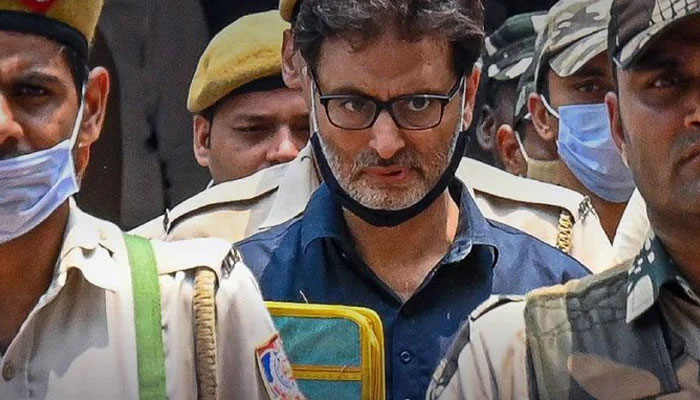India seeks death for Kashmiri leader Yasin Malik
Malik’s JKLF spearheaded a freedom movement in 1989 in Indian-controlled Kashmir
HELD SRINAGAR: India’s top anti-terrorism investigation agency Friday again sought the death sentence for Muhammad Yasin Malik, a leading Kashmiri independence figure, after he was given life in prison, official sources said.
Muhammad Yasin Malik, 57, chief of Jammu Kashmir Liberation Front (JKLF), pleaded guilty last year to funding terrorism after refusing to accept a government-appointed lawyer or to defend himself against the charges.
The court turned down a plea by the National Investigation Agency for a death sentence, saying capital punishment was for a crime that “shocks the collective consciousness” of society.
On Friday, the NIA petitioned the High Court in New Delhi again seeking a death sentence for Malik, a senior security official in Indian-administered Kashmir told AFP. The petition is due for hearing on Monday, legal news website Bar and Bench reported.
Malik’s JKLF spearheaded an armed freedom movement in 1989 in Indian-controlled Kashmir. India responded with a massive military campaign and the conflict has left tens of thousands of civilians, soldiers and militants dead.
Malik renounced violence in 1994 to campaign peacefully for independence, meeting with Indian leaders, including two prime ministers, over the following years. He was repeatedly jailed, spending 14 years in prison where he claimed he was tortured, and was finally arrested in 2018, months before New Delhi cancelled the restive region’s semi-autonomy, imposing a lockdown and communications blockade lasting months. Tension has simmered in the Muslim-majority region since, with many accusing Hindu nationalist Prime Minister Narendra Modi of seeking to change its demographic balance.
Malik rose to prominence in 1990 when his group abducted the daughter of India’s interior minister and released her in exchange for five colleagues from Indian prisons.
-
 Prince William Warned His Future Reign Will Be Affected By Andrew Scandal
Prince William Warned His Future Reign Will Be Affected By Andrew Scandal -
 Amy Madigan Reflects On Husband Ed Harris' Support After Oscar Nomination
Amy Madigan Reflects On Husband Ed Harris' Support After Oscar Nomination -
 Is Studying Medicine Useless? Elon Musk’s Claim That AI Will Outperform Surgeons Sparks Debate
Is Studying Medicine Useless? Elon Musk’s Claim That AI Will Outperform Surgeons Sparks Debate -
 Margot Robbie Gushes Over 'Wuthering Heights' Director: 'I'd Follow Her Anywhere'
Margot Robbie Gushes Over 'Wuthering Heights' Director: 'I'd Follow Her Anywhere' -
 'The Muppet Show' Star Miss Piggy Gives Fans THIS Advice
'The Muppet Show' Star Miss Piggy Gives Fans THIS Advice -
 Sarah Ferguson Concerned For Princess Eugenie, Beatrice Amid Epstein Scandal
Sarah Ferguson Concerned For Princess Eugenie, Beatrice Amid Epstein Scandal -
 Uber Enters Seven New European Markets In Major Food-delivery Expansion
Uber Enters Seven New European Markets In Major Food-delivery Expansion -
 Hollywood Fights Back Against Super-realistic AI Video Tool
Hollywood Fights Back Against Super-realistic AI Video Tool -
 Pentagon Threatens To Cut Ties With Anthropic Over AI Safeguards Dispute
Pentagon Threatens To Cut Ties With Anthropic Over AI Safeguards Dispute -
 Meghan Markle's Father Shares Fresh Health Update
Meghan Markle's Father Shares Fresh Health Update -
 Samsung Galaxy Unpacked 2026: What To Expect On February 25
Samsung Galaxy Unpacked 2026: What To Expect On February 25 -
 Travis Kelce Takes Hilarious Jab At Taylor Swift In Valentine’s Day Post
Travis Kelce Takes Hilarious Jab At Taylor Swift In Valentine’s Day Post -
 NASA Confirms Arrival Of SpaceX Crew-12 Astronauts At The International Space Station
NASA Confirms Arrival Of SpaceX Crew-12 Astronauts At The International Space Station -
 Can AI Bully Humans? Bot Publicly Criticises Engineer After Code Rejection
Can AI Bully Humans? Bot Publicly Criticises Engineer After Code Rejection -
 Search For Savannah Guthrie’s Abducted Mom Enters Unthinkable Phase
Search For Savannah Guthrie’s Abducted Mom Enters Unthinkable Phase -
 Imagine Dragons Star, Dan Reynolds Recalls 'frustrating' Diagnosis
Imagine Dragons Star, Dan Reynolds Recalls 'frustrating' Diagnosis




